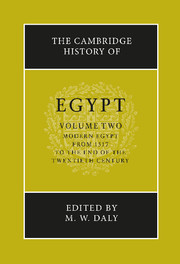Book contents
- Frontmatter
- 1 Ottoman Egypt, 1525–1609
- 2 Egypt in the seventeenth century
- 3 Egypt in the eighteenth century
- 4 Culture in Ottoman Egypt
- 5 The French occupation of Egypt, 1798–1801
- 6 The era of Muhammad ’Ali Pasha, 1805–1848
- 7 Egypt under the successors of Muhammad ’Ali
- 8 The Egyptian empire, 1805–1885
- 9 The ‘Urabi revolution and the British conquest, 1879–1882
- 10 The British occupation, 1882–1922
- 11 Social and economic change in the “long nineteenth century”
- 12 The liberal age, 1923–1952
- 13 Egypt: society and economy, 1923–1952
- 14 Republican Egypt interpreted: revolution and beyond
- 15 Modern Egyptian culture in the Arab world
- Select Bibliography
- Index
- References
11 - Social and economic change in the “long nineteenth century”
Published online by Cambridge University Press: 28 March 2008
- Frontmatter
- 1 Ottoman Egypt, 1525–1609
- 2 Egypt in the seventeenth century
- 3 Egypt in the eighteenth century
- 4 Culture in Ottoman Egypt
- 5 The French occupation of Egypt, 1798–1801
- 6 The era of Muhammad ’Ali Pasha, 1805–1848
- 7 Egypt under the successors of Muhammad ’Ali
- 8 The Egyptian empire, 1805–1885
- 9 The ‘Urabi revolution and the British conquest, 1879–1882
- 10 The British occupation, 1882–1922
- 11 Social and economic change in the “long nineteenth century”
- 12 The liberal age, 1923–1952
- 13 Egypt: society and economy, 1923–1952
- 14 Republican Egypt interpreted: revolution and beyond
- 15 Modern Egyptian culture in the Arab world
- Select Bibliography
- Index
- References
Summary
Introduction
Unlike political events, social and economic processes are not amenable to periodization according to precise starting and ending-points. By their very nature, such processes do not begin at a certain moment in history, but rather mature over time; nor do they end abruptly, but rather tend to peter out gradually. Since the purpose of this chapter is to chart the main processes that took place in Egyptian society, we shall try to define a time frame that can accommodate within its loose boundaries the main social and economic developments. “The long nineteenth century” as conceived here spills over in both directions – it begins with the third quarter of the eighteenth century and ends in the first quarter of the twentieth: “just as the coming of the French in 1798 should not be thought of as a beginning, so the coming of the English in 1882 should not be thought of as an end.”
It has been argued that if we focus on both “continuity and rupture” it is quite obvious that the period of Muhammad ‘Ali should be discussed in conjunction with the second half of the eighteenth century. But at the same time, the 1860s and 1870s were a period of intense change, which mark a rupture with the past:
“The expansion of European commerce, leading to the inflow of European capital, the great changes in communications with the coming of the telegraph in the 1870s, the opening of new schools, the beginning of newspapers and periodicals in the 1870s, and behind them all the demographic changes...all these are very important, and in some ways they can be regarded as opening a new period, and one that continues far beyond 1882.”
- Type
- Chapter
- Information
- The Cambridge History of Egypt , pp. 252 - 284Publisher: Cambridge University PressPrint publication year: 1998
References
- 8
- Cited by

